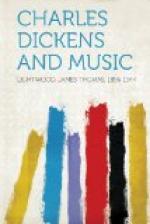Here too were ballads on the old ballad paper and in the old confusion of types, with an old man in a cocked hat, and an armchair, for the illustration to Will Watch the bold smuggler, and the Friar of Orders Grey, represented by a little girl in a hoop, with a ship in the distance. All these as of yore, when they were infinite delights to me.
On one of his explorations he met a landsman who told him about the running down of an emigrant ship, and how he heard a sound coming over the sea ’like a great sorrowful flute or Aeolian harp.’ He makes another and very humorous reference to this instrument in a letter to Landor, in which he calls to mind
that steady snore of yours, which I once heard piercing the door of your bedroom ... reverberating along the bell-wire in the hall, so getting outside into the street, playing Aeolian harps among the area railings, and going down the New Road like the blast of a trumpet.
The deserted watering-place referred to in Out of the Season is Broadstairs, and he gives us a further insight into its musical resources in a letter to Miss Power written on July 2, 1847, in which he says that
a little tinkling box of music that stops at ‘come’ in the melody of the Buffalo Gals, and can’t play ’out to-night,’ and a white mouse, are the only amusements left at Broadstairs.
‘Buffalo Gals’ was a very popular song ’Sung with great applause by the Original Female American Serenaders.’ (c. 1845.) The first verse will explain the above allusion:
As I went lum’rin’
down de street, down de street,
A ’ansom gal I chanc’d to meet, oh,
she was fair to view.
Buffalo gals, can’t ye come out to-night,
come out to-night,
come out to-night;
Buffalo gals, can’t ye come out to-night,
and dance by the
light of the moon.
We find some interesting musical references and memories in the novelist’s letters. Writing to Wilkie Collins in reference to his proposed sea voyage, he quotes Campbell’s lines from ‘Ye Mariners of England’:
As I sweep
Through the deep
When the stormy winds do blow.
There are other references to this song in the novels. I have pointed out elsewhere that the last line also belongs to a seventeenth-century song.
Writing to Mark Lemon (June, 1849) he gives an amusing parody of




